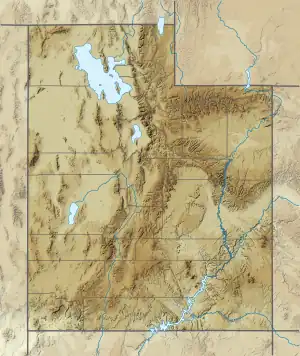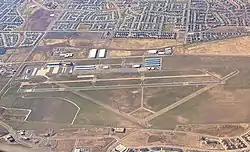South Valley Regional Airport | |||||||||||
|---|---|---|---|---|---|---|---|---|---|---|---|
 2006 USGS airphoto | |||||||||||
| Summary | |||||||||||
| Airport type | Public | ||||||||||
| Operator | Salt Lake City Department of Airports | ||||||||||
| Location | West Jordan, Utah | ||||||||||
| Elevation AMSL | 4,607 ft / 1,404.2 m | ||||||||||
| Coordinates | 40°37′10″N 111°59′34″W / 40.61944°N 111.99278°W[1] | ||||||||||
| Website | https://slcairport.com/about-the-airport/general-aviation/south-valley-regional-airport/ | ||||||||||
| Map | |||||||||||
 U42 Location of airport in Utah / United States  U42 U42 (the United States) | |||||||||||
| Runways | |||||||||||
| |||||||||||
| |||||||||||
South Valley Regional Airport (FAA LID: U42) is a public airport located in West Jordan, seven miles (11 km) southwest of Salt Lake City, Utah, United States. Originally named Municipal Airport No. 2, construction began July 8, 1941, and it opened around July 15, 1942. It is the primary general aviation airport in the area and is a Utah Army National Guard training base with Apache and Blackhawk helicopters.[2] Leading Edge Aviation is the single fixed-base operator (FBO) onsite; the FBO and Alta Aircraft Maintenance operate maintenance facilities, and the FBO and Utah Helicopter Flight Academy operate flight schools.[2]

History
The Salt Lake City Chamber of Commerce first proposed Municipal Airport No. 2 in late 1940. The airport was to be used chiefly for private fliers, to free the Salt Lake port for army and commercial transport use.[3] On June 6, 1941, local contractor Gibbons & Reed was chosen as the winning bid to grade and pave one runway, and build the fencing and drainage and the clearing and grading began on July 8, 1941.[4]
On April 2, 1942, the city commission gave final approval to a contract for V.L. Chapman to construct an 80 foot x 100 foot hangar, make other improvements, and for operation of a commercial flying business, paying the city a $50 per year ground lease for five years and 2 cents per gallon for all gasoline he sold. The target completion date was July 15, 1942.[5]
On July 25, 1942, fifteen Naval Cadets began training by a private flying school under the civil pilot training program.[6]
Around Thanksgiving 1944, a Kearns Flying Club began using privately owned single-engine Taylorcrafts, Porterfields, and a Fairchild. Men of all ranks from Kearns flew these and instruction went on 7 days a week.[7]
The nearby base was sometimes called Army Air Base Kearns, but it had no runways. The Army never controlled or probably landed at Municipal Airport 2. The nine bomber units that arrived and left Kearns did so by train.
Since World War II
After World War II, the airport continued to be Salt Lake City Municipal Airport II. On 10 February 2009, the Salt Lake City Council voted to change the airport's name to South Valley Regional Airport. The council made the change in order to more clearly describe the location and function of the airport and because the traditional name of "Airport II" had "no historical significance."[8][9]
See also
References
- ↑ "South Valley Regional Airport (1434590)". Geographic Names Information System. United States Geological Survey, United States Department of the Interior. Retrieved 2013-10-25.
- 1 2 "Salt Lake City Airport II". Utah Airport Operators Association. Retrieved 2009-10-11.
- ↑ 1941, July 8, "Airport Work Starts at S.L., Fields will be Used for Private Fliers," The Ogden Standard Examiner.
- ↑ 1941, June 7, "Army Studies Airport Bids," The Salt Lake Tribune
- ↑ 1942, April 3, "Board Makes Hangar Award," The Salt Lake Tribune.
- ↑ 1942, July 26, "Flight Courses Commence in S.L.", The Ogden Standard Examiner.
- ↑ 1945, January 28, "Kearns Flying Club Off to High Start," The Salt Lake Tribune.
- ↑ "Resolution No. 11 of 2009 (Renaming of Airport II)" (PDF). SLC.gov. 10 February 2009. Archived (PDF) from the original on 4 August 2020. Retrieved 6 August 2020.
- ↑ Halladay, Karen (27 January 2009). "Memo: Renaming of Airport II in West Jordan to South Valley Regional Airport" (PDF). SLC.gov. Archived (PDF) from the original on 4 August 2020. Retrieved 6 August 2020.
External links
- South Valley Regional Airport (on Salt Lake City International Airport's website)
